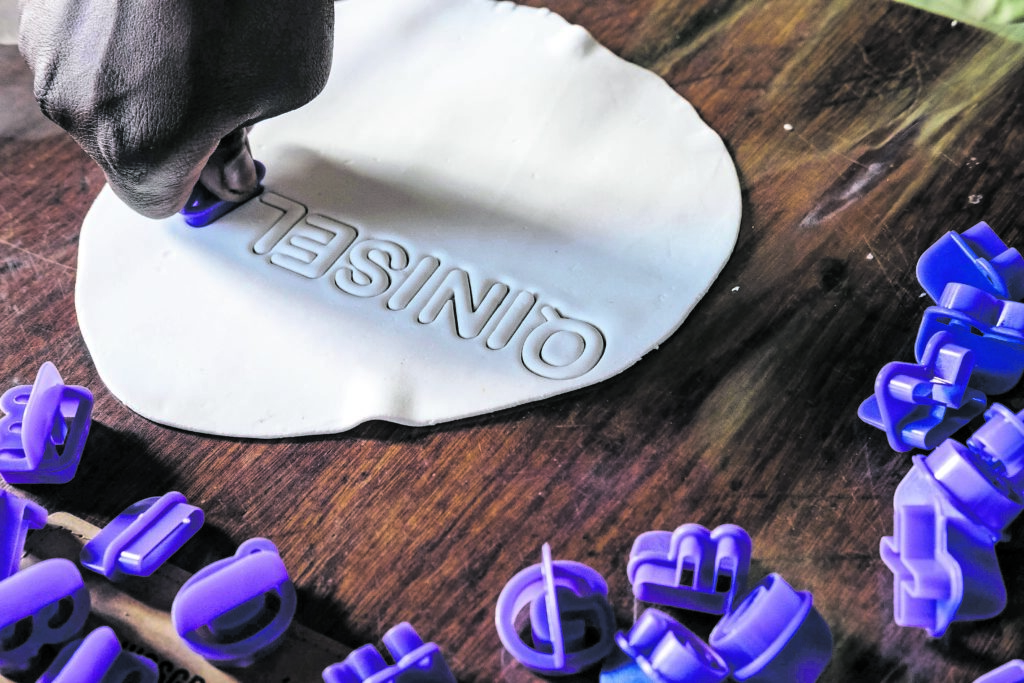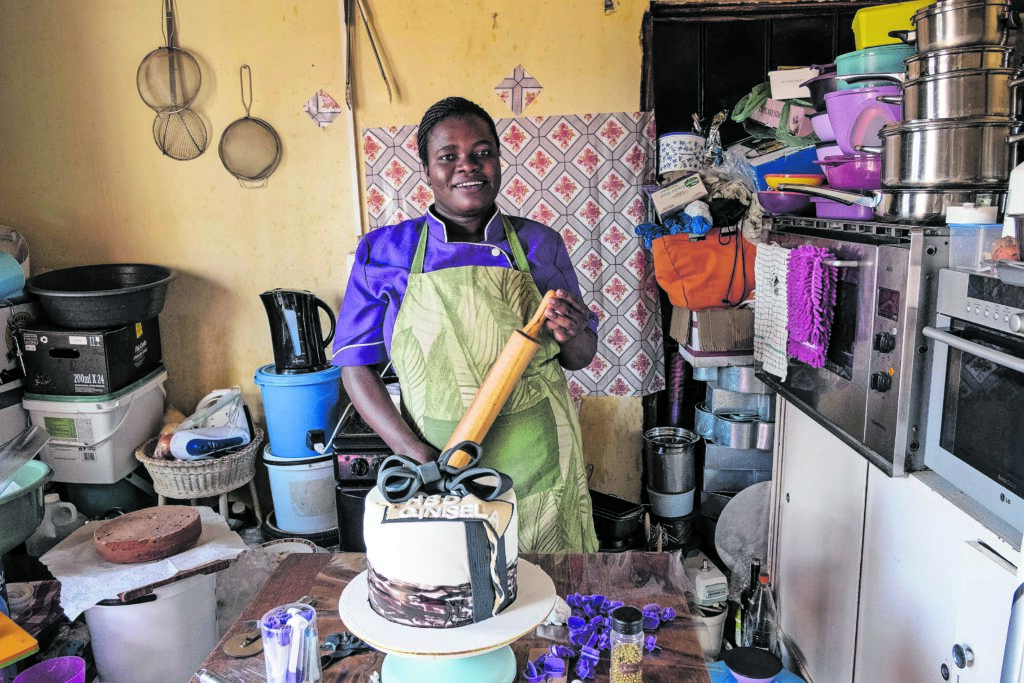Cake boss: Nothando Nyathi makes a cake at her home in Thulani, Soweto. Business has been slow since the Covid-19 pandemic hit, but she still dreams of owning a bakery one day. Photo: James Puttick
When Nothando Nyathi saw the elaborate, towering birthday cake of her Spiderman-obsessed four-year-old’s dreams in 2014, she had two thoughts. First, “I could never afford that” and then, “but maybe I could make it”.
Sure, the cake had tiny, sculpted, fondant figures and lacy, edible spiderwebs. And sure, she’d never decorated a cake before in her life.
She wasn’t even totally sure what fondant was. But she’d learn. How hard could it be?
Seven years later, on a humid Sunday afternoon, Nyathi swept a paintbrush along the base of a sky-cake as she remembered the single-minded focus that the Spiderman cake had inspired in her.
“I was sad I couldn’t give my son the one thing he wanted most,” she says. “So I promised myself I would learn.”
And she did. Each month, she put aside a few hundred rand from her salary as a nanny. At night, she watched chirpy baking tutorials on YouTube on her phone from the small Soweto house she shared with her husband and son.
 Nothando Nyathi makes a cake at her home in Thulani, Soweto. She taught herself how to bake and decorate cakes and runs a small business called ‘Extraordinary Cakes’. Photographer: James Puttick.
Nothando Nyathi makes a cake at her home in Thulani, Soweto. She taught herself how to bake and decorate cakes and runs a small business called ‘Extraordinary Cakes’. Photographer: James Puttick.
And when she’d saved enough, she signed up for a beginner’s cake-decorating class at a baking school in Orange Grove.
Soon, she was channelling most of her savings into advanced courses at baking schools in Pretoria and Randburg. Most of the other students were suburban housewives, or retirees picking up a new hobby — the kind of woman who, out in the world, might hire Nyathi to look after her children.
For them, this was a hobby, a way to pass the time. For Nyathi, it was meant to be the ticket out.
She came to South Africa from Zimbabwe in 2005, to join a quiet, steady man from home called Fighter who’d asked her to try this new life with him. In Jo’burg, she found work as a waitress. She saved Fighter’s name in her phone as “That’s my love”.
When their first child, Fortune, was born in 2010, Nyathi began to clean and work as a nanny so that she could be home with them in the evening.
When she began learning how to decorate cakes, however, it was as though a switch had flipped.
As a child in a village in the Matopos Hills near Bulawayo, she’d been raised by her grandmother while her mother worked as a domestic in Johannesburg. They saw her only in December, when she swept in on a tidal wave of hugs and new dresses.

And she baked. Thickly sliced bread they ate with jam and margarine. Cookies and vetkoek. Items they never had during the rest of the year.
“For me there was always so much happiness associated with baking,” she says. “I want to give that joy to someone else in the things I create.”
At the same time, she realised, making cakes was a kind of sculpture. And sculpture was something she’d also been doing since she was a child, when a cousin taught her to shape clay they scooped from the ground into the shape of cow heads.
Now, in her two-room Johannesburg house, she practised making octopi from fondant and painted delicate, edible lilies. She made cakes the shape of bikinis and tuxedos and Minnie Mouse’s ears. Each year, for her birthday, she saved up the money to do another course — drip cakes, flower design, macarons.
The business grew slowly. Then lockdown hit.
On the TV in their small bedroom, Nyathi and Fighter watched hours of the American TV show Cake Boss. She took notes on how they made their figures. “I’m going to have a bakery like that one day,” she told him.
But a year later, business still hadn’t recovered. People weren’t having big parties. They couldn’t afford elaborate cakes.
One weekend in February, Nyathi had a rare busy stretch — two cakes due in the span of two days. Wearing a purple cook’s uniform with matching purple eyeshadow, she buzzed around her kitchen, which was stacked floor to ceiling with baking supplies — cake pans and mixing bowls, giant tubs of fondant and ovens in various states of disrepair.
They didn’t have running water inside, so between steps in her baking process, she carried stacks of bowls and spoons outside to clean them in the communal sink the family shared with two others on their property.

Nyathi was making a makeup bag for a teenager’s birthday. She flipped a glossy sheet of blue fondant over a layer cake and began to press seams into it, like the pillowy folds of a bag.
“People say: ‘Oh, these are so beautiful. It will be a shame to eat them’,” she says, as she runs her brush over the spine of the bag, leaving a trail of edible glitter behind. “I say: ‘No, please, eat it. And when you’re done, come place another order’.”